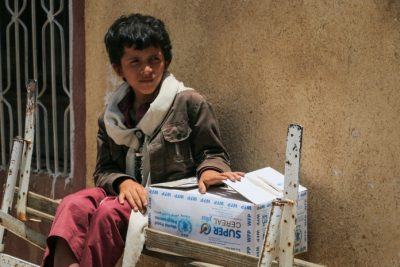Ending the War in Yemen Means Overcoming Political Cowardice
UN World Food Program says that “400,000 children may die in Yemen this year without urgent intervention”

All Global Research articles can be read in 51 languages by activating the “Translate Website” drop down menu on the top banner of our home page (Desktop version).
Visit and follow us on Instagram at @crg_globalresearch.
***
The struggle to end U.S. support for the war in Yemen has run into another obstacle. This time it’s partisanship. But it isn’t Republican opposition blocking Joe Biden’s promise to end U.S. participation in the world’s worst humanitarian catastrophe. It’s the president’s own hesitancy to keep his word paired with the unwillingness of Democrats in Congress to cross a president from their own party.
On February 4th, in his first major foreign policy address as president, Biden said, “we are ending all American support for offensive operations in the war in Yemen, including relevant arms sales.” In the next breath, however, the president said, “We’re going to continue to support and help Saudi Arabia defend its sovereignty and its territorial integrity and its people.”
Seeking clarification, a congressional letter led by Representatives Peter DeFazio, Debbie Dingell, and Ro Khanna (and signed by 41 of their colleagues) was sent to the president on February 25th, asking key questions. What’s the definition of offensive operations? What is the difference between offensive and defensive weapons? What about the blockade? They requested an answer to their questions by March 25th, the 6th anniversary of the war in Yemen. They received a non-answer, two months late.

[Source: theintercept.com]
Another opportunity for answers came at a hearing on April 21st where Special Envoy to Yemen Tim Lenderking, Biden’s diplomatic point man on the crisis, took questions from Congress. Asked by Rep. Ted Lieu whether the United States was still supporting Saudi Arabia’s offensive operations in Yemen, Lenderking couldn’t—or wouldn’t—answer. He said, “I’m not totally in that information loop, congressman, so I can’t really speak to that.”
Letters led by Elizabeth Warren in the Senate and Ted Deutch in the House have encouraged the Biden’s administration to use their leverage to get Saudi Arabia to stop its blockade on Yemen. But U.S. Special Envoy Lenderking has denied the existence of a blockade to CNN investigative reporter Nima Elbagir, a claim she called, “just not true.” In fact, the Friends Committee on National Legislation reports that “No U.S. official in the new administration had explicitly publicly acknowledged the six-year-old, Saudi-imposed blockade—much less criticized it.”
President Biden was clear on the campaign trail: He said that if he were elected president he would make Saudi Arabia, “pay the price, and make them in fact the pariah that they are.” Despite the promise of his February 4th announcement, he simply hasn’t done it. And Congress has not held him to his word.
During Trump’s tenure, bipartisan majorities in the House and Senate voted to end U.S. participation in the Saudi war on Yemen. Every Democratic member of Congress voted for a War Powers Resolution stating that U.S. participation in the war is not authorized and must be ended. President Trump vetoed that legislation.
On January 25th of this year, Representative Ro Khanna spoke at the World Says No to War in Yemen International Day of Action, which Massachusetts Peace Action helped to organize. He said, “Senator Sanders and I will be advocating and introducing again a War Powers Resolution to stop any logistical support, any intelligence support, and military support, to the Saudis in their campaign in Yemen. That has to take place.” What is he waiting for?
The U.S. continues to provide logistical support that keeps the Saudi Royal Air Force in the sky, bombing Yemen. The Special Envoy to Yemen can’t answer basic questions about whether the U.S. still supports Saudi Arabia in Yemen. He denies the existence of the blockade, a tactic that employs starvation as a weapon.
Members of congress who championed ending the war in Yemen through privileged War Powers Resolutions, like Congressman Ro Khanna, Senators Bernie Sanders, Mike Lee, and Chris Murphy, aren’t being consistent now that Biden is President.
We must pressure them. One courageous member of Congress can force the entire legislative branch to go on record. It’s difficult to criticize your allies, but thousands of lives are at stake. The UN World Food Program says that, “around 400,000 children may die in Yemen this year without urgent intervention. That is roughly one child every 75 seconds.” They can’t wait any longer. Neither can we.
*
Note to readers: Please click the share buttons above or below. Follow us on Instagram, @crg_globalresearch. Forward this article to your email lists. Crosspost on your blog site, internet forums. etc.
Brian Garvey is an organizer with Massachusetts Peace Action based in Cambridge, Massachusetts. He can be reached at [email protected].
Featured image: WFP Provides Food Assistance to a Record 7 Million People In Yemen In August 2017. UN World Food Program. [Source: wfp.org]

